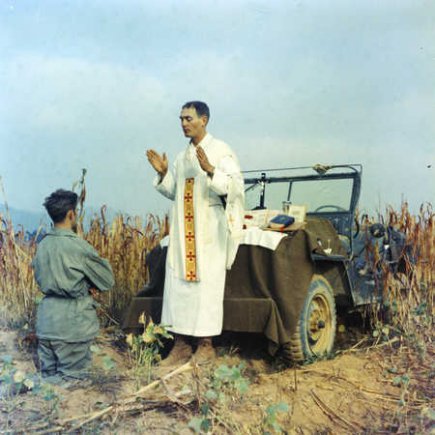After the World Trade Center was burning from the plane bombs which were deliberately flown into the office towers, Fr. Judge rushed to the scene of the attacks to minister to those in need. [Editor's Note - Fr. Judge was not mortally wounded while administering last rites but from falling debris standing alongside his Firefighting Brothers on the World Trade Center grounds]
After administering last rites to an injured firefighter, Fr. Judge was struck by falling debris and killed. Fr. Judge was the first recorded fatality following the terror attack. Some have dubbed the image of five emergency workers carrying the remains of the fallen Fr. Judge as the "American Pietà"
Fr. Judge's example of heroic ministry to those in their time of need is an excellent counter-example to the trend of barring clergy at mass casualty events. After the Boston Bombing on Patriots Day 2013, priests in adjacent parishes rushed to the scene of the Boston Marathon Massacre to anoint the dying, but police refused them access to the bomb victims. As eight year old Martin Richard lay dying from shrapnel from the pressure cooker bomb, two priests were denied access to the scene, which may have prevented him from receiving Last Rites.
While Fr. Tom Curzon, OMV, who was one of the priests turned away from the Boston Marathon Bombing, later said that he understood that:
They [law enforcement] were trying to keep safe a very unstable, chaotic area. Even the police who were there on the perimeter, they had no idea what was behind them. All they knew was that they needed to clear out the area, and they had no idea how much they themselves were standing in harm's way.
The clergy who rushed to minister to the bombing casualties resorted to set up a table to distribute fruit and water to those who approached them.
While safely securing a perimeter by law enforcement makes sense, it is premised on the presumably unimpeachable "safety" provision. This ignores decades of tradition where ministers worked side by side with what we would today call emergency workers to do their spiritual work. Asymmetrical warfare and terror tactics may provoke some caution in emergencies, but priests and ministers have long heeded Christ's exhortation that: “No greater love than this, to lay down one’s life for one’s friends” (John 15: 13), especially in emergencies.
 Sixty years after his death, Fr. Emil Kapaun, an Army Chaplain was posthumously awarded the Congressional Medal of Honor for his bravery on the battlefield and in prison camp during the Korean War. When his commanders ordered an evacuation of their position, Fr. Kapaun stayed with the wounded, comforting the injured and the dying. In prison camp, his comfort and ministering, Fr. Kapaun's faith was instrumental. As President Barack Obama put it during the presentation of the medal:
Sixty years after his death, Fr. Emil Kapaun, an Army Chaplain was posthumously awarded the Congressional Medal of Honor for his bravery on the battlefield and in prison camp during the Korean War. When his commanders ordered an evacuation of their position, Fr. Kapaun stayed with the wounded, comforting the injured and the dying. In prison camp, his comfort and ministering, Fr. Kapaun's faith was instrumental. As President Barack Obama put it during the presentation of the medal:That faith -- that they might be delivered from evil, that they could make it home -- was perhaps the greatest gift to those men; that even amidst such hardship and despair, there could be hope; amid their misery in the temporal they could see those truths that are eternal; that even in such hell, there could be a touch of the divine. Looking back, one of them said that that is what “kept a lot of us alive.”
Even though Fr. Kapaun was ministering to the military on the battlefield, the virtues of giving hope to those in their time of despair and caring for the spiritual health of their souls at a time of trauma.
While there certainly is a security element in the impetus to bar ministers from mass casualty circumstances, it may also be an imposition of secular civics, either out of political correctness or atheist over-expansion of the "separation of church and state".
On September 10th, 2001, Fr. Judge gave what turned out to be his final homily to firefighters. Fr. Judge's peroration was focused on firemen, but his words ring true to ministers in a mass casualty situation:
What great people. We love the job. We all do. What a blessing that is. A difficult, difficult job and God calls you to it. And then He gives you a love for it so that a difficult job will be well done. Isn't He a wonderful God? Isn't He good to you? To each one of you? And to me! Turn to Him each day. Put your faith and your trust and your hope and your life in His hands, and He'll take care of you and you'll have a good life.Fr. Judge embodied that exhortation. A prayer was found in the pocket of the fallen New York Fire Department's Chaplain which has been put on plaques and prayer cards and epitomizes the call of ministry.






No comments:
Post a Comment